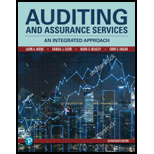
Explain the difference and similarities between evidence in a legal case and evidence in an audit of financial statements.
Explanation of Solution
Audit Evidence: The piece of evidence provided by the audit team to prove their opinion with respect to the audit are known as audit evidences. It includes accounting information related to the evidence and their source.
Evidence in legal case and in an audit of financial statements is used by balanced person to conclude. The incorrect decision in both circumstances are not welcomed. Likewise investors could lose significant amount of money, if investors rely on materially misstated financial statements. On the whole the guilt of a defendant in a legal case has to been proven in a way that should be beyond a reasonable doubt. This is related to the concept of adequate evidence in audit situation. An auditor cannot be completely convinced that judge or jury’s opinion is correct but it should attains high level of assurance.
The difference is that legal case depends on witness and other parties involved. Inquiry is an evidence used by auditor and other evidence like confirmation with third parties, physical examination and inspection are also used extensively. Because of the nature of the conclusion made, a legal case also differs from an audit. In legal case a judge or jury decides the guilt or innocence of the defendant but in audit, after evaluating the evidence the auditor issues one of several audit opinions.
Want to see more full solutions like this?
Chapter 7 Solutions
EBK AUDITING+ASSURANCE SERVICES
- Darton Enterprises had total assets of $420,000 and total liabilities of $155,000 at the beginning of the year. If total assets increased by $97,000 during the year, and total liabilities decreased by $42,000, what is the amount of owner's equity at the end of the year? Answerarrow_forwardCan you help me solve this financial accounting problem using the correct accounting process?arrow_forwardDiscuss the implications of the revenue recognition principle on the reporting of long-term contracts or projects that span multiple accounting periods.arrow_forward
 Accounting Information SystemsAccountingISBN:9781337619202Author:Hall, James A.Publisher:Cengage Learning,
Accounting Information SystemsAccountingISBN:9781337619202Author:Hall, James A.Publisher:Cengage Learning, Auditing: A Risk Based-Approach (MindTap Course L...AccountingISBN:9781337619455Author:Karla M Johnstone, Audrey A. Gramling, Larry E. RittenbergPublisher:Cengage Learning
Auditing: A Risk Based-Approach (MindTap Course L...AccountingISBN:9781337619455Author:Karla M Johnstone, Audrey A. Gramling, Larry E. RittenbergPublisher:Cengage Learning Auditing: A Risk Based-Approach to Conducting a Q...AccountingISBN:9781305080577Author:Karla M Johnstone, Audrey A. Gramling, Larry E. RittenbergPublisher:South-Western College Pub
Auditing: A Risk Based-Approach to Conducting a Q...AccountingISBN:9781305080577Author:Karla M Johnstone, Audrey A. Gramling, Larry E. RittenbergPublisher:South-Western College Pub- Business/Professional Ethics Directors/Executives...AccountingISBN:9781337485913Author:BROOKSPublisher:Cengage




